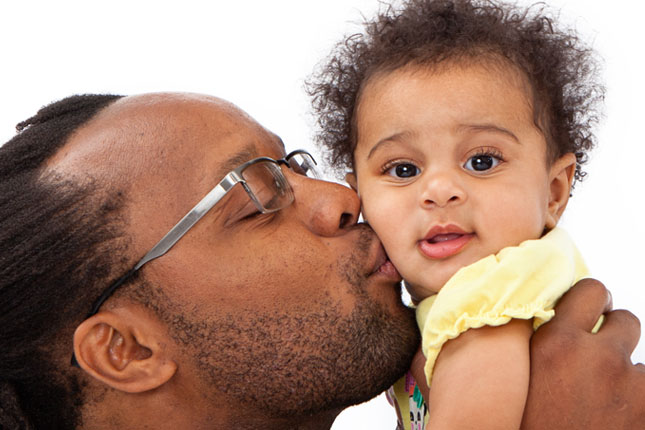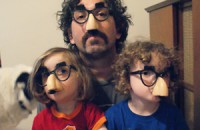Parent Savers
The New Breed of Dads
Please be advised, this transcription was performed from a company independent of New Mommy Media, LLC. As such, translation was required which may alter the accuracy of the transcription.
[00:00:00]
[Theme Music]
Jason Kreidman : Whether it's because moms are working more, divorce rates are higher, or just because more is expected of them, dads today are taking on more and more responsibilities with child raising that only a generation ago would have been seen as out of place. What are some of the reasons for this, and how can new dads know what to do? I'm Jason Kreidman, founder of Dudes to Dads, and this is Parent Savers, episode 40.
[Theme Music/Intro]
Johner Riehl : Welcome to Parent Savers, broadcasting from the Birth Education Center of San Diego, I am your guest host, Johner Riehl. Parent Savers is all about helping new and new again parents from the baby years to the toddler years. Not only that we have great experts, but we love to involve our listeners as well, so give us a tweet, shoot us an email, or call our hot-line and we will get your questions answered. We love hearing from you. Make sure to visit the Parent Savers website too and sign up for our free newsletter and don't forget, we have a Parent Savers Club were you can download the archived episodes and get exclusive content and more. Make sure to visit www.ParentSavers.com for more information. Well let's get rolling on today's topic, we got an all dads crew here in the studio. For starters, let's go around and introduce ourselves. I'm a new again parent, my son Zyler is 18-months-old, I also have a 3-year-old and a 5-year-old boy, and I'm joined by two other new parent panelists in the studio, as well as Jason.
Jerry Butanda : Hi, my name is Jerry, I'm 31, I'm a speech pathologist and I have one daughter, her name is London and she is 21-months-old.
Scot Killian : Hi, my name is Scot Killian, I am 36, a certified financial planner, I am a father to one boy, Alex, he's 3.
Jason Kreidman : My name is Jason Kreidman, internet marketer, I have two kids, Cason, who is 4, and Farah is 2.
[Theme Music]
Johner Riehl : For today's news headline segment, we're going to look at a story that's kind of been around since New Year's, it's an interesting story we found about a drunk woman who got into a fight with some other people about her baby, basically because she went out on New Year's Eve, was too drunk, and the babysitter didn't want to give her baby back. It happened that a highly intoxicated woman was arrested after she allegedly attacked two other people in an argument over her baby. The 22-year-old woman who got into an argument with two other people after she tried to get her 2-month-old back from her babysitter, and the deputy wrote in the press report that the woman was “highly intoxicated”. And during the argument, the woman actually struck one of the victims several times in the face, chest and arms, and I gues it kind of raises the issue of what responsibilities does a babysitter have or a parent have, is it a special thing, 'cause it was New Year's Eve? What do you guys think about the babysitter not turning the baby back over to the parent?
Scot Killian : Well, you hire a babysitter because you want to protect your child, so that's number one, you're not protecting the mom or the dad, so the babysitter did right in my opinion.
Jerry Butanda : I want the babysitter's phone number, because I want that babysitter.
Jason Kreidman : Yeah, exactly, I think she should have gotten more from this, I mean, you know that your baby's out, there only two months-old, and you go out, yeah, you can have some fun on New Year's, but if you're going to get highly intoxicated and start swinging on people, like that's right...
Jerry Butanda : That's really crossing the line, but I think that, certainly, we've gone out the night with a babysitter, maybe had a couple of cocktails, maybe we were on walking distance or something, but is there a level between like, you can't do anything, you can't have any drinks and have a good time, or...?
Scot Killian : I think it's just like driving, I mean you have to make sure that there's somebody responsible who's not drinking, so I think when you do, you're going out and you're going to party, as a responsible adult you've got to take in consideration that you have a child, that's the difference between being a single man and a family man.
Jerry Butanda : I think that's the difference between being a responsible adult, and a responsible parent. Like you have somebody else that's waiting for you, that you need to come and get, again, it wouldn't make any difference if they were two months or two years old, you still need to be a responsible parent. But this child's two months old. It's not like it's an old thing, were older kids they can take care of themselves. Like, maybe she's breastfeeding, maybe she's not, there's still all these other considerations that... why are you getting drunk? Why are you...
Johner Riehl : She's 22.
Jerry Butanda : But still... that doesn't make it...
Jason Kreidman : Yeah, I totally agree and I think it's a great job done by this babysitter, and that's why you hire a babysitter for, exactly as Scot said.
Johner Riehl : And the article seems to suggest some belligerence there too, I mean coming back after a party and having a few cocktails is different than coming back swinging.
[Theme Music]
Johner Riehl : For this week's dads only episode of Parent Savers we have Jason Kreidman, founder of Dudes to Dads, a local San Diego group dedicated to helping dads with the transition from single man to family man. Jason is here to talk about what he's doing to help get dads more involved, and to talk about some of the reasons he thinks this may be happening. Thanks for joining us, Jason.
Jason Kreidman : Thank you, thanks for having me!
Johner Riehl : So what made you start Dudes to Dads, can you tell us a little bit about the group and how it started and what it does?
Jason Kreidman : Sure! We had just had our second child, and work was stressful, having a second child was stressful, and realizing that, just kind of dealing with the daily life I started reaching out to learn more about parenting, I was getting frustrated with little things everyday, and I took some parenting classes, I really enjoyed it, but found it, you know, me talking to my friends who didn't necessarily relate to this, or when we go out and hang out, we're not really talking about our emotions or talking about what's going on, especially with the kids. So I started reaching out and finding there is really not much for guys, and for dads, and dealing with that transition from being a happy single guy to now having two kids, married, and the stress that comes with that, and loving every minute of it, but really figuring out how to deal with it. So I started Dudes to Dads, this was really recent, a couple of months ago, and so far the feedback has been incredible, and we meet every other Tuesday, and we talk, and it's great.
Johner Riehl : Yeah, there's no doubt that it's just different, right? It's not that it's bad different or good different, well, it actually is good different, I would probably say, but it's different.
Jason Kreidman : I would never go back to the way that it was, although I enjoyed my live prior to this, I could not imagine going back that way.
Johner Riehl : So what kind of dads are you seeing in Dudes to Dads, is it a lot of guys like you or is it folks from different walks of life that are just facing these issues?
Jason Kreidman : You know, from my experience, because I have young children, I kind of thought that that was were the group would focus, whether it's toddlers or not, because of that transitional part, but I'm finding there's actually some people that are joining the group that are soon to be expecting dads. So they're kind of taking a proactive approach to before they have the child, to figure out, “How I am going to deal with this”.
Johner Riehl : Looking back at my dad and how he is, he's pretty stoic, he goes to work almost everyday, and that's how he's always been, and so something like this doesn't seem like anything he would have ever wanted to do or even looked at, so what do you think it's the difference now, on our generation, where now dads are wanting to do this, why? What's the difference?
Jason Kreidman : Well, first, it's a hard sell, there's no question, this is, from a marketing perspective, part of it is talking to moms, the moms probably convincing the guys, the dads to go, “Hey, I think this would be a great thing for you”. What guys have to realize too is the fact that if they do step out and do this, they're going to score some serious points with their wifes.
Johner Riehl : What I think it's really funny is that I read a lot of dad blogs, and what I find is that most of the comments are made by the moms, it's not really followed by the dads, and they're like “Oh yeah, I need to get my husband to do this” or “I need to do that”, it's hilarious.
Jason Kreidman : Yeah, if you talk to women and they here about Dudes to Dads they're like, “Oh, my husband has to do that!”, but that's not what this is about, it's about the husband really wanting to participate, to do it.
Johner Riehl : Most of my friends, they really want to find it out themselves, they want to go to the library, to buy the books, they want to do it all themselves, and the last thing they want to do is to actually talk about what their experiences are, probably because they don't know if they're alone in it or not. But I've never heard of something like this, I think I really commend you for creating something like this.
Jerry Butanda : Yeah, and like you were saying earlier in the introduction, you were saying that you talked to your other guy friends and they may not be able to relate to it, and that was my situation, none of my guy friends had kids when I had my daughter, and they still don't, so I feel like most of my life now I can't really hang with them, I can't really talk to them about what's going on, so I think something like this is actually a really good idea.
Jason Kreidman : Thank you, yeah, and part of your immediate friends didn't see, maybe weren't as interested because they didn't want to get so close, whereas when we come together as a group of strangers, you'd be amazed of how deep somebody can get, and how much information their going to divulge. But we also have some policies, it's completely confidential, that's the one thing, you know, what happens at Dudes to Dads stays at Dudes to Dads. That's the one thing to it, you're encouraged to share ideas and things with your spouse, but the idea of specifics of things that happen or very very specific things about other people, we really want to keep it confidential.
Johner Riehl : I think that that kind of sets off the stage for why you're here and what we want to talk about. So I think that generally speaking, I couldn't imagine the previous generation of dads getting together for a meeting and to talk about things. And I think all of us today are feeling like all these different expectations or responsibilities. So I think we should talk a little bit about what kind of stuff are we doing as dads, and maybe where's that coming from, is that something you guys talk about at the group?
Jason Kreidman : Yeah, I have a funny story. I just had my first child, I was in a gym, and there's an older gentleman, I'd say 20 or 30 years older, so from the previous generation. He came up to me and he said, “Hey, congratulations! I heard you had a child”, and I said, “Yeah”, and he said, “Are you changing diapers?”, I said, “Of course I'm changing diapers, because it's my son”, he's like, “I had four children and not once have I ever changed a diaper!”, and he was proud of that.
Johner Riehl : That's crazy, right?
Jerry Butanda : That's insanity.
Jason Kreidman : And I said, “You have four children who grew up and you never changed a diaper?”, and he was very proud. It's absolutely a difference in generations.
Johner Riehl : It's stunning! I actually have a friend though, one of our friends, he like put his foot down and he didn't want to change diapers, and it actually was almost a repulsed feeling that I had, how can you, as a dad these days, have those feelings? But I guess that's a lot there. But in general, I feel that more guys are like us now, of course we're going to change our kids.
Jerry Butanda : You can fast-forward to this generation, in my household, I have changed virtually every single diaper! It's true, I wouldn't be married if I wasn't changing diapers. It's crazy.
Johner Riehl : So maybe it's not so much changes in us, maybe it's a change in the women, that the women said, “Hey! Go do it!” There's a difference in strength and a difference in maybe a certainty that, “Listen, I'm not going to put up with it!”, you know, you've got to go do share. 'Cause guys, when they're told what to do, they'll go do it. Guys need to be told. We can maybe learn over a long period of time, but if the wife says go change the diaper you'll say OK, I go change the diaper, but the idea is that the child might sit there for hours with a dirty diaper, 'cause you do not think about changing the diaper. And that's just the way that we're wired. I think that communication has helped, with women saying, “Hey, listen, I need help”, and being comfortable with asking for the help, and guys willing to do it.
Scot Killian : If you think about what's happening now, with moms, women joining the labor force, and being 50 or more percent of the labor force, you're seeing a lot of stay at home dads, instead of stay at home moms, so it's kind of a paradigm shift, and what do you do? We're really in an interesting time, it's just interesting to see how things are evolving, the roles that have actually changed. I can't imagine growing up and having my dad come home from work and take me to the doctor, I don't know if he ever did. Mom would though, and today it's going to be the dad or the mom, there's going to be...
Jason Kreidman : Yeah, that's sort of, I heard some parents, some older generations say, “Yeah, I kind of started parenting in their teenage years”, that's when they get involved, when the dad can find that they throw the ball really fast, their son's playing sports or their daughter's going somewhere, I mean that's kind of the idea that, “Oh yeah, that's when I got involved”. These are the rich years, these early early years are really what's amazing in some of the experiences you have.
Johner Riehl : Do you think, Scot, that you're experience with that, did you make a conscious decision that you're going to be more engaged? Do you think that maybe on some subconscious level? Because your dad was not going to the doctor appointments or whatever, that you were trying to do more? Or is it just kind of happening? Like what do you think, Scot and also Jason?
Scot Killian : It was absolutely my upbringing that made me, that conditioned me to act how I do as a father, today it's... I look back and usually I find my friends fall into two camps, you either want to emulate your parents or you want to do the exact opposite. I am the latter of the two, I feel like it was really important for me to act a certain way, for Alex and any future kid that I have, because it gives them a fighting chance to do certain things that I didn't have growing up.
Jason Kreidman : I don't think mine was so much of an influence of my parents more than I really just want to be the best. To me it was, I'm bringing in somebody into the world, it's like my marriage, I'm certainly not perfect, but I want to be, and that's the idea of striving to do that, and I think that for me, that was more of a drive with the child. It was: I'm having this child, I want to be the best parent I can, and how can I do that? Granted I read way too many of those books and I shouldn’t have. But the idea, just wanting to be really good at it. And there's some pressures with that, a lot of pressure that you put on yourself, so I think part of the group Dudes to Dads is to relieve some of that pressure and to say that it's OK not to be perfect, you can't be a perfect dad, a perfect husband, a perfect son, etc. Each day starts over the next day. And you can say, “Well, I was really good as a dad today, but guess what, I paid no attention to my wife”, and vice-versa. And so I think that you have that ability to do that.
Johner Riehl : I think that's great. After the break, let's talk a little more about some of the specific things of what we're doing but then also about how we as dads can kind of handle it all, because as we have this new responsibilities and doing more, we also have our traditional responsibilities as well. We'll talk about that and more after the break.
[Theme Music]
Johner Riehl : Alright, we're back, we're picking off the conversation with Jason Kreidman from Dudes to Dads, talking about the new dads today. I guess we never actually answered the question at the end of the segment talking about why do you think dads are different today. Maybe we can't answer it a little bit more but I think it's worth looking at it a little bit further.
Jason Kreidman : I know that for me, personally, I felt that unless I was going to change a diaper and do something productive with my child, I wasn't going to be involved until they were 15. Because my wife breastfed, and she still continues to, so I feel like a lot of the activities, especially when they're not crawling, not active, is all revolved around mom. So if I'm not going to make a decision to be involved, and changing diapers and do as much as I can, than I'm really not going to bond with my daughter. So for me personally that was my decision, if I'm not going to at least change some diapers, I'm not going to see the kid, because they are pretty much with mom all of the time.
Johner Riehl : There was that little motivation for me too to just do the best I can for my wife, so it actually wasn't even the thought process of me bonding with the child. I think that some of it was, but it's, “Wow, my wife has to do all this stuff, what can I do to help?” And you can't breastfeed,
Scot Killian : No, not yet.
Johner Riehl : Isn't that a scene from “Meet the parents”, he's trying to breastfeed? Yeah, I think that there's a lot of that, where you're trying to help and do the best you can, but you're right, the baby's being breastfed, she's the one getting up at night to feed him, I can maybe get a bottle once in a while to do that, so it's hard to feel like you're bonding with the baby, especially when it's brand new.
Jason Kreidman : Or to feel useful, I felt like a lot of the time I wasn't useful, I was just kind of hanging around, I felt like I need to be productive, I'm sitting at home and I'm not just going to be watching TV while you're doing stuff, I'd be productive.
Johner Riehl : So what are you guys doing, cleaning, changing diapers, making the bottles ahead of time, what are some other things that you guys have done or heard about that we can do to help our wifes?
Jason Kreidman : I think that's also in the baby stage, actually when you get to the toddlers, it's one of the things that I talked about in Dudes on Dads, just coming home from work and immediately engaging with the children. So if there's no unwind period, it's drop whatever I'm doing and engage immediately. And it's amazing how that affects both the children and then my wife looking at me and go, “Oh, look at him!” You get some bonus points. It always benefits you.
Scot Killian : I think that it doesn't matter what the activity is, if you're raising your children or you're going to work, you need a break, you can easily come home and do your work at home, but I think even if it's a great thing that you're interacting with your kids, but it's a break from whatever activity you were doing. And so for you it's a break from work, and for your wife, if she's staying at home, it's a break from being with the kids all day.
Jason Kreidman : The parenting is a multifaceted thing, when you become a parent you have a responsibility to be a good partner to your significant other spouse and you have a responsibility to be the best you can be to your children. So moms need their alone time, being overly happy to take your child and go to a park for several hours, which is what I do every Saturday pretty much, and just allowing her to do what she needs to do. And yeah, we can't breastfeed, we can't do a lot of things, and beyond that, she's good at a lot of things that I'm not good at. So finding the things that you're strong at and making sure that you're doing that. I'm not a handyman either but I was able to learn how to install a diaper sprayer at the end of the toilet, I'm responsible for the diapers, I can wash those,
Scot Killian : And every time company comes over you point out, “I installed that!”
Jason Kreidman : You're darn right!
Johner Riehl : What are some things that working dads, and I mean these tips might even apply to working moms too 'cause I know that we have a lot of moms that work as well, to help balance the responsibilities that are being piled upon us? It's not like we're saying that if we're working we're just going to quit our jobs so we can be a stay at home dad and offer full time support, but on the same token we're doing roles that a generation ago we weren't doing. What are some tips, do you think, for these dads?
Jason Kreidman : Something that's worked for me is actually sitting down and mapping it out, and mapping the days out, kind of like your children really appreciate routine, it's the same thing in the household, where you say, “Hey, listen”, 'cause I know for example Friday, Saturday and Sunday nights I'm typically in charge of dinner, so we either we make Mexican food on Friday night or go do something else. And we've kind of taking that on, with certain responsibilities, cleaning or doing some chores or whatever, we have predefined roles rather than just, “Who's going to do it this time?”. Maybe you do switch every other week a certain role or responsibility or chore, or something like that. So I think it's actually sitting down and writing all that out, and kind of looking at, “Here's what we have to do, here's who's going to do it”, and we'll switch or whatever that might be, like you said, some people are good at some things and some people are good at others, so that worked for me really well.
Johner Riehl : I was going to ask, you know, I have some friends that are very more traditionalists, and they feel like sometimes you may talk about, “I do the laundry, I do this and that”, and you kind of get flak for that. How do you feel about that, what kind of things do you say or how do you still feel like, “I'm a guy”.
Jason Kreidman : Well I will say that my wife is wonderful and does most of that stuff. At the same time, there are things that, especially, it's the same thing of needing help, saying, “Hey, listen, I need you to do this”, but we have a pretty clear understanding of our roles and responsibilities, so there's not often an expectation to say, “Hey, why aren't you doing X, and vice-versa”. I mean, for many of us. And than if there is some problem or there's a scheduling conflict or something, “Hey, can you help me out with this?”. You feel like you're on a team, you really do, you feel like on this team and it's like, you can really get support from the other person.
Johner Riehl : I think that's what's really important, to remember that you're teammates. But you're talking about laundry and that kind of maid me realize that what happens a lot of times in my house is that I've got a different threshold for when I think that we really really need to do laundry than my wife does.
Jason Kreidman : You have pink underwear that goes with the reds and the wites.
Johner Riehl : And so, she'll kind of like, you kind of find where the thresholds are a little bit different, and what responsibilities are.
Jason Kreidman : Well I'll give you a trick, you can mess up the laundry once, and than you don't have to do it anymore.
Johner Riehl : That's true, that's true...
Jason Kreidman : “I just can't seem to iron this shirt, how do you do it?”
Johner Riehl : There have been plenty of discussions on that topic in our household. I've been outed by doing that.
Jason Kreidman : I think it's just sharing, it's just really writing them out and have a clear understanding of what your roles and responsibilities are. And one of the things that we're all saying here is that you are a unit, and you are family, and so sitting down and actually figuring out, “OK, what do we want to make sure that our family does on a daily basis?”. In our household, Andrea is a phenomenal cook, she could do a lot of the chores, and that would be at the expense of the good food. I would much prefer to have great food, I'm happy to do the things. If I'm talking with a bunch of dudes, it might seem a little emasculating or something, it doesn't matter, I want to eat good food.
Johner Riehl : That's a great argument, good food is worth it. But if anyone ever gives me flak for like, lets say I like to go on Pinterest and do pins, “Oh, that's totally for girls”, all I have to say is, “Yeah, ask my wife how effeminate I am or how not heterosexual I am”, not that there's anything wrong with that, but whatever works for you and your family, that's what you got to figure out.
Jason Kreidman : I think if you're getting flak, it becomes your own confidence, I mean you're getting flak, because I'll tell you what, when I said that I was starting this Dudes to Dads thing I was very hesitant to say, especially to people I knew, to say anything, and after now a while, I'm very proud of it. You become to sort of own it and as you get more and more into it, and you kind of realize what matters, the fact if somebody looks weird at that or looks down upon it, it probably got the wrong stuff going on. And I think that just comes over time, with confidence.
Johner Riehl : And I think overall, with guys, we all kind of feel each other out, to kind of decide like, “I'm not really sure that I'm going to be accepted if I say that that's OK, so I'm going to wait”. And I feel like once somebody breaks the seal, they're just kind of like OK, “Yeah! I do that to”, and “Oh my God, I just did all the laundry yesterday”. I mean I feel like you have to kind of wait and find out. And the confidence is such a great issue, because one of the things that I don't think has changed from the generations is that dads must be the picture of testosterone for the family, higher levels of testosterone exude confidence, and so it doesn't really matter what you do if you're confident that you are projecting yourself the you should as a man in a way that you couldn't if you were a mom. Well I'm definitely proud to be the new dad that we are at this generation. For listeners that want to learn more about Dudes to Dads specific groups, or maybe in other areas, can you give me some advice on how to connect with you or how to maybe find a group in their area that may be similar?
Jason Kreidman : Sure, I started with meetup.com, and that's how I thought just how to start to this group and get some word out, so my website, I guess the website address for the meetup is meetup.dudestodads.com, and also we have twitter.
Johner Riehl : We'll have all that information on the Parent Savers website, but if you're in another area, you can go to meetup and look for similar groups
Jason Kreidman : Yeah, you could even look for groups or if you feel like this is something that you can start yourself. My group's kind of concentrated on North San Diego, which is very specific, but don't be afraid to start a group, even if it's just a couple of buddies or friends getting together. Be open to discussing these kind of things and you'll be amazed at how good you feel. I come out of those meetings feeling so good with the idea that this is just a great thing to be able to share. I'd say it's like a therapy session, but it is, it's kind of like you feel that one, you've gained some knowledge and then also two, you may be helping somebody else by sharing your experiences.
Johner Riehl : That's great. Well, thanks so much Jason for helping us learn more about the new breed of dad and having this discussion. If you want to get more information about today's show, go episodes page on ParentSavers.com, where we also linked all the information about Jason's Dudes to Dads as well as other information about how you could meet up. Our conversation will actually continue with Jason after the show for our Parent Savers Club members, so stick around and see our website if you do want to sign up for that program. We'll be talking about the best and worst parts about being a dad.
[00:25:21]
[Theme Music]
[Featured Segments: The Daddy Complex]
David Vienna : Hi Parent Savers, this is The Daddy Complex, I'm David Vienna, father of twin boys, and if my experience has tought me anything about parenting it's that I know nothing about parenting. If you're expecting your first child, I'm sure some of us told you in passing that along with welcoming a new life into your house, you will also welcome a hoard of germs. We were told when our boys went to preschool that they pick up colds pretty frequently. It turns out that the word “frequently” doesn't accurately convey exactly how often a child can take an illness. And it's not just colds, oh sweet merciful Christ, no! First let me tell you this, and please understand that it is not an exaggeration: your child will have a runny nose pretty much from age 2 to 3. And I don't mean off and on, I mean a year long runny nose, perhaps longer. The only variables are how much it runs and the color of it. Second: whatever bug they pickup, you will get. There's no avoiding it. They touch everything, they want to share food, your home will become a hazmat's team worst case scenario. And the frequency thing I mentioned? The illnesses will come on average every month, sometimes more than that. I just got over my first cold or sore throat or whatever in six weeks, now my wife has it and it knocked her out. Which brings me to my third and final point: these illnesses are nothing like you've ever experienced. Somehow the colds and stomach bugs picked up by adults are exponentially greater. When your child gets a cold, he will maybe have a restless night and a cough, when you get it, it will be an end of days lifestyle that will leave you whimpering for help. From all these illnesses that my boys got at home I only managed to avoid one, and that's because I locked myself in the bedroom with a weeks supply of spaghetti and a complete DVD collection of Space. Yes, you should wash your hands often. By the way, another thing they don't tell you is that if you wash your hands so much, your skin will literally crack and will bleed. Not kidding. By the time you see your child sneeze it's already too late. Washing your hands at that point is just to teach them how to do it. You might also show them how to work the can opener so that they can feed you spaghetti when you're too weak to feed yourself. Check out more of my parent advices at DaddyComplex.com, on Huffingtonpost.com or on twitter at the DaddyComplex. You can also view episodes of Fighting With Babies, my webseries for parents, at the DaddyComplex.com. And be sure to keep listening to Parent Savers for more parenting tips.
[Theme Music]
Johner Riehl : That raps out today's episode, we would love to hear from you! Tell us what you think. If you have questions for Jason or any of our other experts on topics we discussed, call our Parent Savers hot-line at 619.866.4775. Give us a tweet on Twitter or comment on our Facebook page, or send us an email through our website, ParentSavers.com. And don't forget, Parent Club members tune in to our behind the scenes chat that's starting right now. Next week we'll continue discussions and topics that new dads and new moms care about taking a look at circumcision. Thanks for listening to Parent Savers, empowering new parents!
[Disclaimer]
This has been a New Mommy Media production. Information and material contained in this episode are presented for educational purposes only. Statements and opinions expressed in this episode are not necessarily those of New Mommy Media and should not be considered facts. Though information in which areas are related to be accurate, it is not intended to replace or substitute for professional, Medical or advisor care and should not be used for diagnosing or treating health care problem or disease or prescribing any medications. If you have questions or concerns regarding your physical or mental health or the health of your baby, please seek assistance from a qualified health care provider.
[00:29:00]
[End Of Audio]











